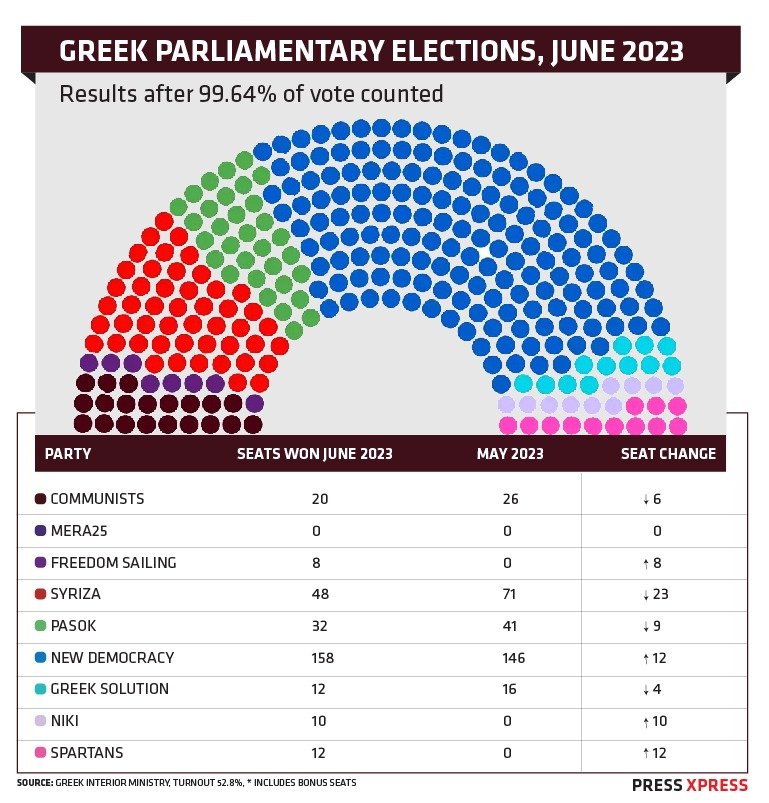Greek voters re-elected the conservative New Democracy party by a landslide on Sunday, preliminary results showed, setting the stage for the party’s leader, Kyriakos Mitsotakis, to consolidate his power with an absolute majority and a “strong mandate” for the foreseeable future.
In the most recent elections in Greece, the conservative New Democracy party, commanded by Kyriakos Mitsotakis, achieved a resounding victory. The leader of New Democracy stated that his commanding 24-point lead over the main opposition party of the left, Syriza, gave him a “strong mandate” to modernize a country that has long been perceived as resistant to reform.
You can also read: 2024 Republican nomination: Who have thrown their hat in the ring so far?
“The people have given us a secure majority,” the center-right politician said in a televised address as jubilant scenes unfolded outside his party’s headquarters. “Major reforms will go ahead with speed,” he added.
Eleven days after a migrant boat tragedy off the coast of Greece in which an estimated 500 people died, the voting took place. There were three days of mourning, but the tragedy had little impact on the campaign, and the Greeks voted to maintain economic stability.
Election results
Mitsotakis’ party received just over 40.5% of the vote, nearly 23 points more than his primary opponent, Alexis Tsipras of the left-leaning Syriza party. In May, he defeated Syriza, but his party fell short of a majority in the 300-seat parliament. His decision to call an election in an effort to establish a stable, single-party government was vindicated by Sunday’s result. Now, with an anticipated substantial majority in Parliament, Mitsotakis will have an additional level of autonomy in formulating policy.
Mitsotakis won approximately 158 seats in the 300-member Greek Parliament, while Tsipra received 47 seats and 17.8 percent of the vote. The socialist Pasok party came in third with 12.5 percent of the vote and 32 seats, followed by the communist KKE party with 7.6 percent – both demonstrating improvements over their May showings.
The newly founded far-right Spartans party won 4.7% of the vote and entered parliament, achieving electoral success. Ilias Kasidiaris, a former member of the outlawed neo-Nazi organization Golden Dawn, supported their ascent. This demonstrates the continuing threat of far-right ideologies in Greek politics.

Despite scandals that plagued the Mitsotakis government toward the end of its term, including revelations of wiretapping targeting senior politicians and journalists and a deadly train crash on February 28 that exposed inadequate safety measures for public transport, voters appear pleased to have returned to power a prime minister who delivered economic growth and reduced unemployment.
In a statement from his party’s headquarters in Athens, the capital, Mitsotakis described the results as “a strong mandate, to move more quickly along the road of major changes.” “New Democracy is today the most powerful center-right party in Europe,” he told delighted supporters in Athens.
Why New Democracy is successful?
The victory secured by Mitsotakis, 55, over Alexis Tsipras’s Syriza is an uniqueness in Greek politics, as few parties increase their share after a first term in office. In addition, he was able to attract more youthful voters than his opponent. His party benefited from the fragmentation of the left-wing vote, with PASOK predicted to receive more than 11% and the KKE around 7%. The key factors for 2nd term success are-
Economic stability and growth:
Under Mitsotakis’s leadership, Greece has made significant progress in steering the country to economic stability. After three large bailouts totaling €280 billion, Greece emerged from a decade-long crisis and ended spending controls imposed by international lenders. The economic downturn had a profound impact, with unemployment reaching 27.5%, poverty rates increasing, and disposable household income falling below 2003 levels. The crisis also led to severe material deprivation, a decline in healthcare accessibility, and a brain drain as skilled professionals left the country.
In his first term, Mitsotakis oversaw economic growth, reduced unemployment, and improved credit ratings. Greece’s GDP has recovered, and taxes have decreased while pensions and the minimum wage have increased for the first time since the crisis began.
This economic success resonated with voters who desired sustained prosperity and tax cuts.
“I never promise miracles,” he said on Sunday, “but I can assure you that I will remain faithful to my duty, with planning, devotion and chiefly hard work.” He added that his second term could “transform” Greece with dynamic growth rates that would increase wages and reduce inequalities, and he vowed, “I will be the prime minister of all Greeks.”
Focus on public health and education:
New Democracy’s campaign prioritized improving the public health service and education system. Mitsotakis outlined high goals to transform Greece, addressing the needs of the people and emphasizing the importance of accessible and quality healthcare and education.
Migration policy and national sovereignty:
Migration policy played a role in the Greek elections because it has been a significant issue in Greece in recent years. Greece’s handling of the migration crisis, particularly the government’s swift response to external threats, resonated with voters. The 2020 migration crisis, during which Turkey attempted to push migrants into Greek territory, shifted public opinion in favor of stricter immigration policies and protecting national sovereignty.
Challenges ahead of Mitsotakis
The landslide victory of the New Democracy party in the Greek elections is unquestionably a significant victory, but it is not without its challenges. In spite of its strong mandate and parliamentary majority, the party led by Kyriakos Mitsotakis will confront numerous challenges in fulfilling its promises and transforming Greece.
Numerous Greeks face an ongoing cost-of-living crisis, which is one of the primary obstacles. Under Mitsotakis’s leadership, the economy has shown signs of stability and development, but the population continues to bear the weight of high taxes and living expenses. Addressing this issue and delivering on the promise of lower taxes will necessitate meticulous planning and economic measures to ensure that the benefits reach those who require them the most.
The need to enhance public health services and education represents a further crucial obstacle. The COVID-19 pandemic has exacerbated significant strains on the Greek healthcare system. To meet the demand for quality healthcare, reduce wait times, and ensure that all citizens have access, substantial investments and reforms will be required.
In addition, the rise of far-right and hard-right parties like the Spartans presents a challenge to the New Democracy government. Utilizing nationalist and anti-immigrant sentiments, these parties have garnered support. To ensure the stability and cohesion of the nation, it will be essential to balance the needs of a diverse electorate while preserving social cohesion.
Who is Mitsotakis?
Mitsotakis, a graduate of Harvard University, comes from one of the most prominent political families in Greece. In the 1990s, his late father Constantine Mitsotakis served as prime minister, his sister as foreign minister, and his nephew as mayor of Athens. He has pledged to rebrand Greece as a member of the eurozone that is pro-business and fiscally responsible.
Early life and career:
In March 1968, Kyriakos Mitsotakis was born in Athens. In 1986, he matriculated from Athens College as Salutatorian. In 1990, Mitsotakis received his bachelor’s degree in Social Studies from Harvard University. During his Harvard studies, he was awarded the Hoopes and Tocqueville prizes. Mitsotakis also holds a Master of Arts in International Relations from Stanford University and a Master of Business Administration from Harvard Business School.
Mitsotakis was a financial analyst for Chase Investment Bank and a consultant for McKinsey & Company in London. In 1997, he returned to Greece and began working as a senior investment officer for Alpha Ventures. In 1999, Mitsotakis became the chief executive officer of NBG Venture Capital at the National Bank of Greece. In January 2003, the World Economic Forum nominated him as a Global Leader of Tomorrow.
Political career:
Mitsotakis resigned from NBG Venture Capital in April 2003 so that he could pursue a career in politics. In 2004, 2007, 2009, 2012, and 2015, he was elected to parliament as a member of New Democracy. Mitsotakis was the New Democracy shadow minister for the environment and climate change until June 2012. He served as chairman of the environment committee of the Hellenic Parliament from 2007 to 2009.
From June 2013 until January 2015, Mitsotakis was the minister of administrative reform and e-governance. From February 2015 until November of the same year, he served as the first New Democracy representative in Parliament.
On January 10, 2016, Kyriakos Mitsotakis was elected President of New Democracy. He has served as the prime minister of Greece from July 8, 2019, to May 24, 2023.


